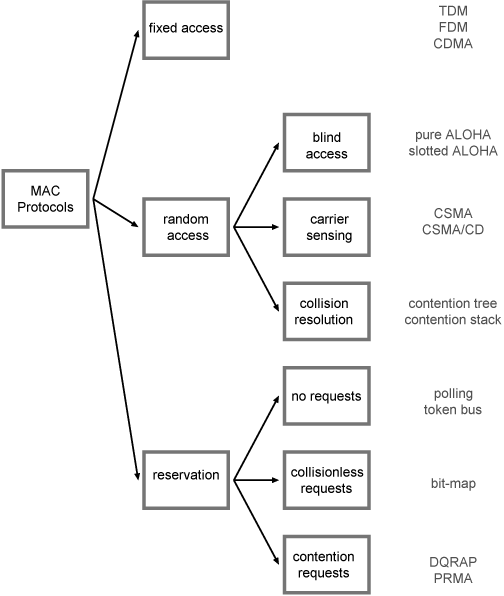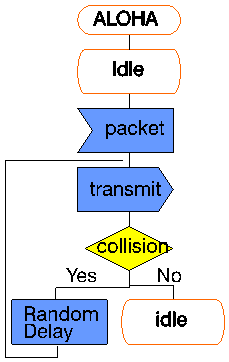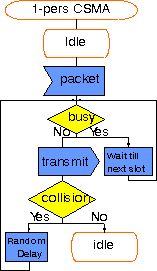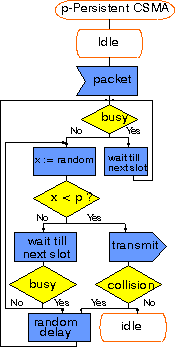Random Access
Many terminals communicate to a single base
station over a common channel.
Fixed multiple access methods (TDMA, FDMA,
CDMA) become inefficient when the traffic is bursty.
Random Access Protocols work better for many users, where
each user only occasionally sends a
message
Random Access Protocol Classification

Commonly Used Protocols
- ALOHA
- Carrier Sense
- Inhibit Sense
- Collision Resolution
- Stack Algorithm
- Tree Algorithm
Reservation methods
- Reservation ALOHA
- Packet Reservation Multiple Access
The ALOHA Protocol
•Developed early 70s at University of
Hawaii
•First realization used radio links to
connect terminals on islands with main computer
•Basic idea is very simple but many
modifications exist (to optimize retransmission policy)
•Any terminal is allowed to transmit without
considering whether channel is idle or busy
•If packet is received correctly, the base
station transmits an acknowledgement.
•If no ackowledgment is received by the
mobile,
1) it assumes the packet to be lost
2) it retransmits the packet after
waiting a random
time
•Critical performance issue: "How to choose
the retransmission parameter?"
- Too long: leads to excessive delay
- Too short: stirs instability
- Unslotted ALOHA: transmission may start
anytime
- Slotted ALOHA: packets are transmitted in
time slots
ALOHA Algorithm: Terminal
Behavior

Carrier Sense Multiple Access :
CSMA
•" Listen before talk "
•No new packet transmission is initiated
when the channel is busy
•Reduces collisions
•Performance is very sensitive to delays in
Carrier Sense mechanism
•CSMA is usefull if channel sensing is much
faster than packet transmission time
·satellite channel with long roundtrip
delay: just use ALOHA
•Hidden Terminal Problem:
mobile terminal may not be aware of a
transmission by another (remote) terminal.

Decision Problem: how to distinguish
noise and weak transmission?
Solution: Inhibit Sense Multiple Access
(ISMA)
Inhibit Sense Multiple Access :
ISMA
Busy Tone Multiple Access : BTMA
If busy, base station transmits a "busy"
signal to inhibit all other mobile terminals from
transmitting
Collisions still occur, because of
- Signalling delay
New packet
transmissions can start during a delay in the broadcasting of
the inhibit signal,
- Persistent terminals
after the
termination of transmission, packets from persistent terminals,
awaiting the channel to become idle, can collide.
Persistency in
Transmission Attempts
Non-persistent
•Random waiting time after sensing the channel
busy
•High throughput, but long delays
1-Persistent
•waiting terminal may start transmitting as
soon as previous transmission is terminated
•Short delays, but more severe stability
problems
p-Persistent
•The channel has mini-slots, much shorter than
packet duration
•Transmission attempt takes place with
probability p
NB:One may combine a very persistent channel
sensing method with a more sophisticated Collision Resolution
method
1-Persistent CSMA Algorithm:
Terminal Behavior

p-Persistent CSMA Algorithm
Terminal Behavior





